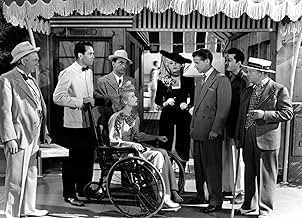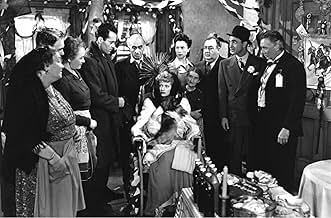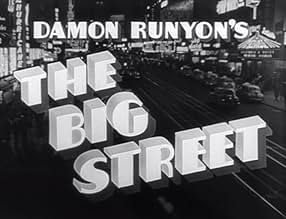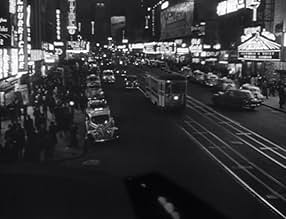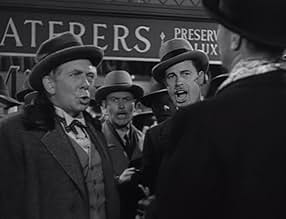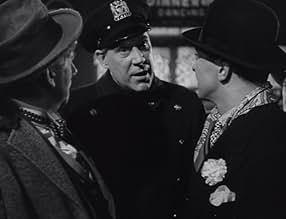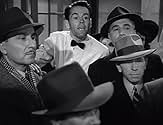VALUTAZIONE IMDb
6,4/10
1777
LA TUA VALUTAZIONE
Un cameriere innamorato non corrisposto di un'artista di un nightclub si avvicina a lei dopo che è rimasta paralizzata da un attacco del suo fidanzato gangster.Un cameriere innamorato non corrisposto di un'artista di un nightclub si avvicina a lei dopo che è rimasta paralizzata da un attacco del suo fidanzato gangster.Un cameriere innamorato non corrisposto di un'artista di un nightclub si avvicina a lei dopo che è rimasta paralizzata da un attacco del suo fidanzato gangster.
- Regia
- Sceneggiatura
- Star
- Premi
- 2 vittorie totali
William T. Orr
- Decatur Reed
- (as William Orr)
Don Barclay
- Eating Contest Emcee
- (non citato nei titoli originali)
Mary Bayless
- Nightclub Patron
- (non citato nei titoli originali)
Louise Beavers
- Ruby - Gloria's Maid
- (non citato nei titoli originali)
Anthony Blair
- O'Rourke
- (non citato nei titoli originali)
Recensioni in evidenza
Broadway busboy Henry Fonda (as Agustus "Little Pinks" Pinkerton) idolizes self-centered lounge singer Lucille Ball (as Gloria "Your Highness" Lyons). When Ms. Ball falls on hard times, Mr. Fonda gets to lend a helping hand. The pair move to Florida, but tragedy follows
Although "Guys and Dolls" (1955) remains most representative, "The Big Street" captures the spirit of writer Damon Runyon's characters better than most Hollywood efforts, probably because Mr. Runyon produced.
They weren't the author's first choice for the leads, but Fonda's innocent charmer and Ball's selfish tragedienne are exemplary characterizations. Ball is especially noteworthy, as she did not receive many opportunities to play against type, and places herself squarely on par with the more successful "Golden Age:" actresses of the 1930s and 1940s; she is startling. Director Irving Reis coordinates his fine cast and crew very well, making camera angles and movement seem uncommonly fresh.
******** The Big Street (8/13/42) Damon Runyon : Irving Reis ~ Lucille Ball, Henry Fonda, Agnes Moorehead, Eugene Palette
They weren't the author's first choice for the leads, but Fonda's innocent charmer and Ball's selfish tragedienne are exemplary characterizations. Ball is especially noteworthy, as she did not receive many opportunities to play against type, and places herself squarely on par with the more successful "Golden Age:" actresses of the 1930s and 1940s; she is startling. Director Irving Reis coordinates his fine cast and crew very well, making camera angles and movement seem uncommonly fresh.
******** The Big Street (8/13/42) Damon Runyon : Irving Reis ~ Lucille Ball, Henry Fonda, Agnes Moorehead, Eugene Palette
Damon Runyon's short story "Little Pinks" is turned by RKO into a solid acting showcase for Henry Fonda and Lucille Ball, also utilizing a troupe of colorful supporting players to their best advantage. Supper-club singer in New York City is crippled in a fall--and promptly loses her free ticket into high society. The only person who still cares for her is a smitten, well-meaning busboy; he hitchhikes all the way to Miami with the wheelchair-bound chanteuse, where they cross paths again with the well-heeled gangster who caused her unfortunate accident. The melodrama inherent in the main plot is suffused (and some may say strengthened) by the comedic overtures of the character turns, most especially by Eugene Palette and Agnes Moorehead as a couple who love to eat and argue. Ball, floundering at RKO in 1942, was quickly snapped up by MGM after this performance, and its clear why: her narcissistic songbird is self-centered and often ridiculously delusional, but your heart goes out to her anyhow. *** from ****
Anyone who has the slightest desire to learn more about the incredible talent of Lucille Ball and Henry Fonda owes it to themselves to see this marvelous movie. Over the years, these two stars built up such powerful images of themselves as star characters, and most of the public came to know them as a result of the cumulative impressions which they made on our individual consciousness. Your strong impression of Lucille Ball is as a comedian, correct? You seldom if ever think of her as a dramatic actress. Can you imagine Lucille Ball playing a role of a vain self-centered and arrogant harridan who seems to live for the sole purpose of tormenting the lowly busboy who is her one true friend in all the world? Few people can imagine Lucy in such a role, but if you watch this movie, you will see it happen. It is also totally believable because, even though Lucy worked primarily as a comedian, she was a great dramatic actress when she chose to accept a role of that type. As for Henry Fonda, who could even conceive of casting this great actor as a busboy? It was early in his career and he is playing a role of the type that he would never have to play again, but he pulls it off. You wonder at times why he is taking so much abuse from this woman. But the answer is incredibly simple. He deeply loves the woman, and his love comes shining through. If you want to see two great stars at work in the early days of their careers, check out this movie.
For fans of Lucy, Ball's role here takes real getting used to. "Her Highness" character is shrewish and generally not very likable. Ball does, however, get to show some very real chops outside her usual comedic range. As a result, I've got a new appreciation of her as an actress as well as a comedienne.
The movie itself is undermined by a weak central focus. Neither Ball's Her Highness nor Fonda's servile bus boy is easy to identify with. Thus, it's hard to sympathize with the overbearing HH even after she's crippled. Nor is Little Pink's (Fonda) utterly selfless devotion understandable given the imperious way she treats him. As a result, the movie's core flounders. A charitable view might take the movie as a fairy tale where the unlikely bus boy, a prince in his sudden formal wear, rescues the crippled princess if only for a moment.
Of course, being a Damon Runyon creation, there's the usual number of street-smart Broadway mugs. So the margins shine with such colorful types as Palette, Levene, Collins, et al. Also, catch dragon lady Agnes Moorehead in a rare sympathetic role (Shumberg); plus premier eccentric Hans Conreid as the grumpy headwaiter. And for folks interested in 50's TV, there's Wm. T. Orr as handsome socialite Decatur Reed. This is the same Orr who produced many of the popular hour-long TV shows of the late 50's, such as Maverick, 77 Sunset Strip, Lawman, et al. I've seen his name for years, never thinking he might show up on screen.
All in all, the only reason to catch this 80-minute pastiche is for Lucy's surprising performance and the colorful peripheral characters. Otherwise, it's pretty forgettable, especially for fans of Fonda.
The movie itself is undermined by a weak central focus. Neither Ball's Her Highness nor Fonda's servile bus boy is easy to identify with. Thus, it's hard to sympathize with the overbearing HH even after she's crippled. Nor is Little Pink's (Fonda) utterly selfless devotion understandable given the imperious way she treats him. As a result, the movie's core flounders. A charitable view might take the movie as a fairy tale where the unlikely bus boy, a prince in his sudden formal wear, rescues the crippled princess if only for a moment.
Of course, being a Damon Runyon creation, there's the usual number of street-smart Broadway mugs. So the margins shine with such colorful types as Palette, Levene, Collins, et al. Also, catch dragon lady Agnes Moorehead in a rare sympathetic role (Shumberg); plus premier eccentric Hans Conreid as the grumpy headwaiter. And for folks interested in 50's TV, there's Wm. T. Orr as handsome socialite Decatur Reed. This is the same Orr who produced many of the popular hour-long TV shows of the late 50's, such as Maverick, 77 Sunset Strip, Lawman, et al. I've seen his name for years, never thinking he might show up on screen.
All in all, the only reason to catch this 80-minute pastiche is for Lucy's surprising performance and the colorful peripheral characters. Otherwise, it's pretty forgettable, especially for fans of Fonda.
The comments about the Fonda character having 'no reason' to take the abusive and selfishness of the Ball character makes me wonder if this person ever loved anyone unconditionally. There are many people in this world that take worse than the verbal abuse from the person they love and stay with them their whole lives.
The Ball character was very well done and I don't think I remember Ball being a character like that after this movie. I don't like Lucille Ball as a comedienne, its too bad that she wasn't able to continue as a dramatic actress she would have done well.
But the movie is all about love conquering the selfish...wish it was that way all the time.
The Ball character was very well done and I don't think I remember Ball being a character like that after this movie. I don't like Lucille Ball as a comedienne, its too bad that she wasn't able to continue as a dramatic actress she would have done well.
But the movie is all about love conquering the selfish...wish it was that way all the time.
Lo sapevi?
- QuizLucille Ball's favorite of her films. She felt her performance was unjustly ignored by the Academy of Motion Picture Arts and Sciences (AMPAS).
- BlooperWhen they first get to Florida, the closeup shot of Pinks wheeling Her Highness down the street is an obvious rear screen projection.
- Citazioni
Gloria Lyons: Love is something that gets you one room, two chins and 3 kids.
- Curiosità sui creditiOpening credits: "Loser's Lane --- the sidewalk in front of Mindy's Restaurant on Broadway-- is not as high-toned a trading center as Wall Street, but the brokers are a lot more colorful. Generally they prefer to put their money on a prizefight or horserace, but when the action slows, anything can happen and it usually does. Tonight, for example, the citizens of the Lane are discussing the latest contest in their usual quiet way --"
- ConnessioniFeatured in AFI Life Achievement Award: A Tribute to Henry Fonda (1978)
- Colonne sonoreWho Knows?
(1942)
Lyrics by Mort Greene
Music by Harry Revel
Performed by Lucille Ball at the New York nightclub (uncredited)
Reprised by her with Ozzie Nelson and Orchestra at the Florida nightclub (Vocals for Miss Ball by Martha Mears) (uncredited)
Played often in the score
I più visti
Accedi per valutare e creare un elenco di titoli salvati per ottenere consigli personalizzati
- How long is The Big Street?Powered by Alexa
Dettagli
- Data di uscita
- Paese di origine
- Lingua
- Celebre anche come
- The Big Street
- Luoghi delle riprese
- Miami, Florida, Stati Uniti(second unit - exteriors)
- Azienda produttrice
- Vedi altri crediti dell’azienda su IMDbPro
- Tempo di esecuzione
- 1h 28min(88 min)
- Colore
- Proporzioni
- 1.37 : 1
Contribuisci a questa pagina
Suggerisci una modifica o aggiungi i contenuti mancanti


